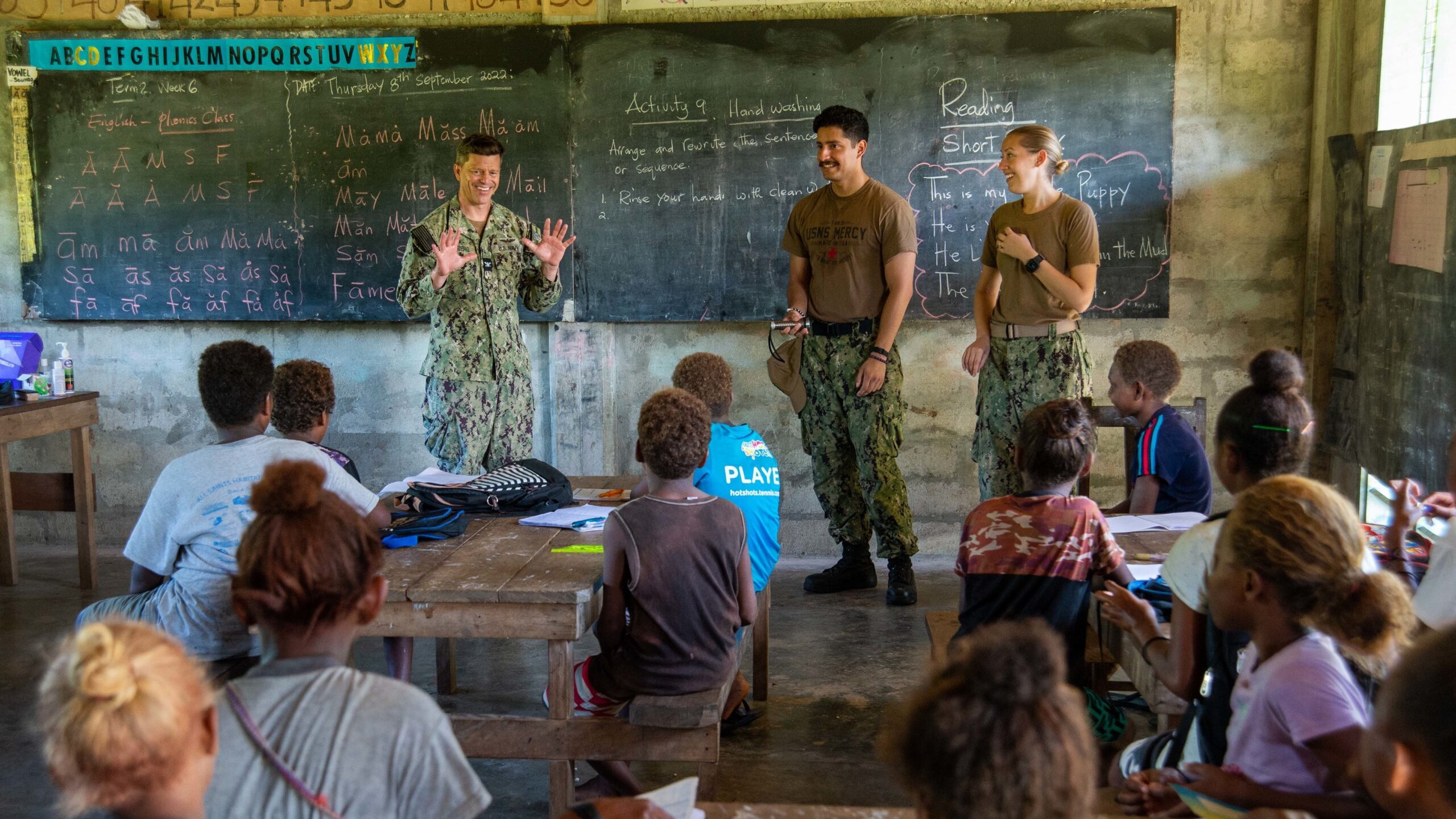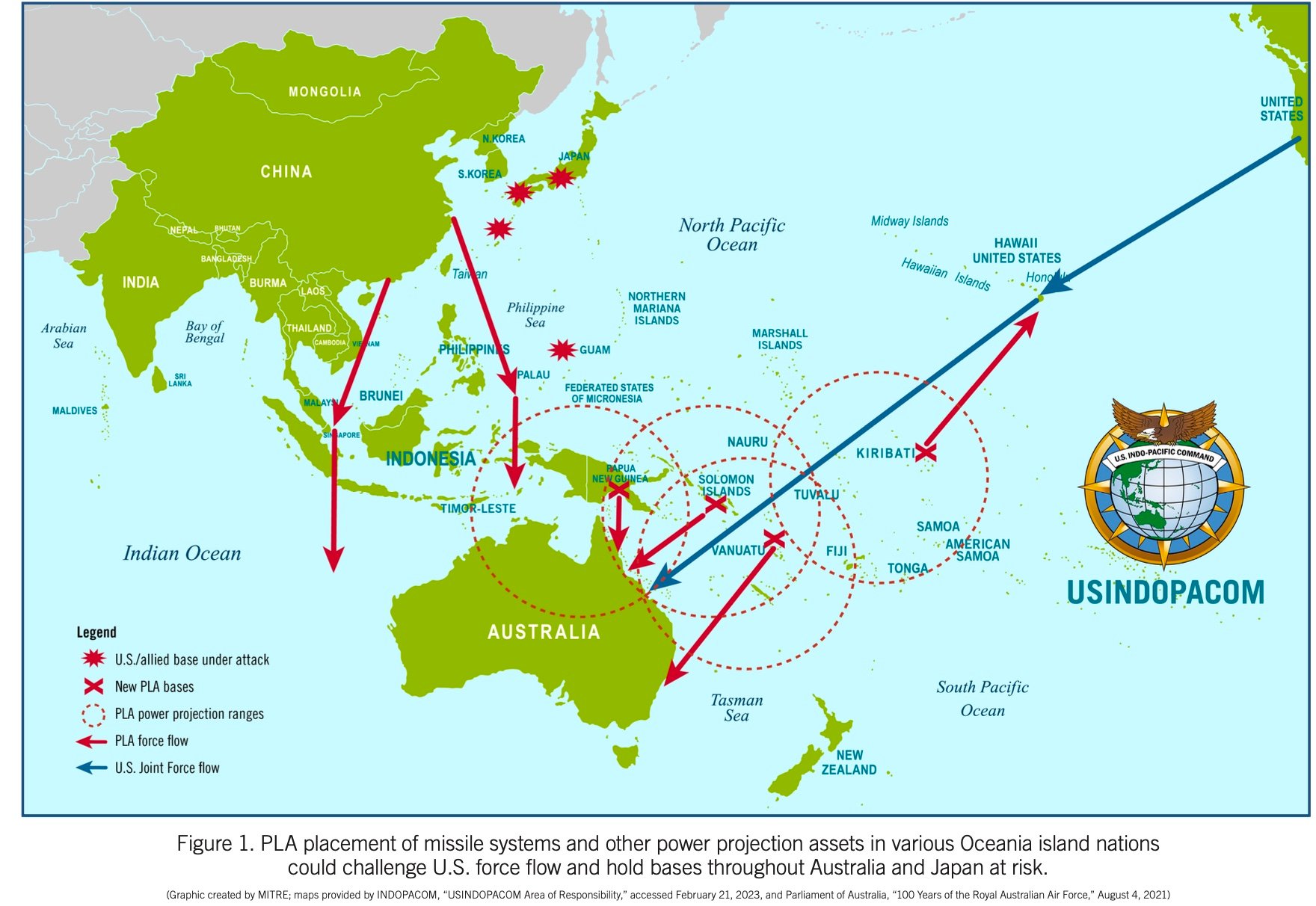COLIN CLARK

SYDNEY — Military training and aid from Australia and the United States alone is not likely to seal the deal with Pacific Island states like Kiribati and the Solomon Islands as the larger countries try to blunt China’s influence operations in the region. Instead, climate change assistance, targeted development help and much improved strategic messaging and engagement are much more likely to be effective in keeping Beijing at bay in the crucial island states that cover a huge portion of the Pacific Ocean, a wargame by the MITRE Corp. found.
“Nearly a century after the last world war brought conflict to the Pacific, Pacific Island Countries (PICs) are once again crucial terrain in a strategic competition,” says the wargame report, published today. “This time the competition is between the People’s Republic of China on one side and the United States and Australia on the other, with nations like Papua New Guinea, Vanuatu, the Solomon Islands, and Kiribati finding themselves courted by all.”
The wargame, dubbed Sage Dragon and run last November, went beyond the usual military-on-military move and countermove to examine broader strategic, political, economic and even intelligence factors that would play key roles in the event of a fight in the Pacific. While the report notes that “Australia looks ever more appealing for operational access and future basing,” it also found that “the ability to move forces to and operate from locations in Australia — and to keep them sustained — depends in large part on secure sea lines of communication near island states such as Kiribati, Papua New Guinea, the Solomon Islands, and Vanuatu.”

Map additions by MITRE Corp. of INDO-PACOM official map.
Kiribati, the report notes, “straddles all four hemispheres and fills an expanse as large as the contiguous United States — [Chinese] forces could wedge between U.S. territories in the western Pacific and target Pearl Harbor with relative ease. Exposure of either set of targets to PLA offensives would undermine U.S. operational plans and threaten to upend its broader competitive.”
But it’s not just military operations that need to guide US and Australian policy in the region, the wargamers noted. Kiribati, for example, possesses enormous potential economic assets in the form of cobalt found on the seabed within its Exclusive Economic Zone. It is estimated to possess three times as much cobalt as can be found in what is called the “global terrestrial reserve base.” Cobalt is a key mineral for touchscreens, batteries and other electronic gear.
So, given how crucial these tiny states are to global military and economic strategy, what are the best ways to encourage them to side with Australia and United States instead of China, which has been pressing hard to win friends and influence people across these reefs, vast stretches of ocean and tiny human population? China has spent copious amounts of cash cultivating senior politicians, government officials and people of influence throughout the Pacific Islands. The US and Australia, when they’ve paid attention to the region, have taken a very different approach.
“One of China’s most salient advantages in the competition is its ability to identify and woo both public influencers and elites in PIC governments, whether via licit or illicit means. U.S. policymakers, in contrast, are more likely to emphasize direct dialogue with PIC civil societies through public diplomacy, including directly exposing Beijing’s corrupting influence whenever possible,” the MITRE report says. “U.S. and allied perspectives on good governance, anti-corruption, and democratic values are important drivers of this asymmetry.”
For fairly obvious reasons, local political and business leaders often perceive that Chinese economic and security assistance is a more palatable “no strings attached” choice, the report says.
But exposing such conduct to the bright light of a warm tropical day can mitigate China’s influence, report author Shane Bilsborough told Breaking Defense in an interview. He offered an example from the game where a natural disaster struck a country.
In this scenario, China had been collecting compromising information about local officials there for years. When disaster struck, Beijing tried to get officials in the affected country to reject US and Australian aid and only accept it from China.
“So the way that the United States countered this was, they had through intelligence means already begun to monitor these collection activities and collect evidence of China’s direct involvement in funding them,” Bilsborough said. During the game, players posing as senior US officials decided to reveal intelligence that China had been flying ministers to the gambling Mecca of Macau and filming their behavior.
The result? “The prime minister or president of the country decided to oust almost his entire cabinet that had been implicated in the corruption scandal,” he said. “It was a highly effective message, which is that look, China is, is trying to corrupt your governments, right? It’s trying to feed poison into your democracies in order to get them not to act in the best interests of the people, but in their own best interest.”
After the real-life debacle of the Solomon Islands government signing a still-secret security pact with China, Australia created its “Step Up” policy and the United States crafted its “Pacific Partnership Strategy” as part of the Pacific Island Partnership, which included an unprecedented White House dinner with President Joe Biden for leaders of 14 Pacific countries.
Bilsborough said the wargaming experts felt “definite optimism that that sort of renewed level of high-level attention in Washington to the region could only bode well.” But he cautioned that it was clear that “concrete, near-term accomplishments” that local politicians can point to during elections will be the key to long-term influence.
Those tangibles, the gamers found, need to be bolstered by “improved messaging from Western allies and the willingness and agility to rebut Chinese propaganda as soon as possible.”
No comments:
Post a Comment